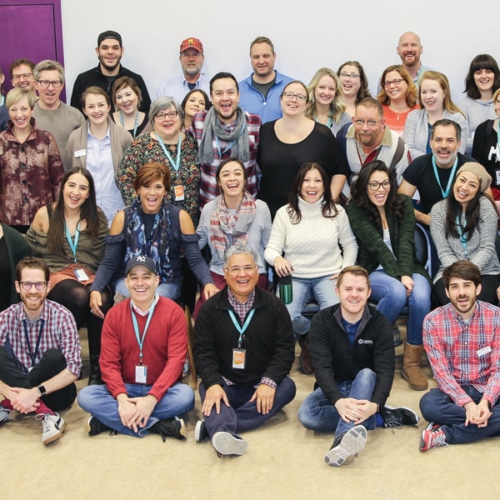Every good story has twists and turns that peak curiosity, capture the imagination and leave you wanting more.
Welcome to the Denver Center for the Performing Arts.
CREATION OF A MULTI-DISCIPLINARY ARTS CAMPUS
1895 — The Denver Post
Back in the Gold Rush era when Denver was little more than a mining camp, theatres outnumbered schools, trains replaced the pony express, and sensational headlines sold the most papers.
When business partners Harry Tammen and Frederick Bonfils bought the fledgling Denver Post, their brand of yellow journalism incited violent reactions leading the men to be horsewhipped and shot. But little could stand in the way of their success.
Ultimately, The Denver Post became the state’s leading newspaper and one of the largest papers in the nation.
1933 — Miss Helen & Theatre
During his lifetime, Frederick married Belle Barton and they had two children, May and Helen. At the age of 21, May eloped with a non-Catholic salesman, which caused a rift in the family. Following Frederick’s death in 1933 and, subsequently, Belle’s death in 1943, Helen inherited the bulk of the estate and became manager and, ultimately, Chairman of The Denver Post.
A noted philanthropist who created the Bonfils Blood Center (renamed in 2018 to Vitalant, Bonfils Tumor Clinic and Bonfils Memorial Theatre (now Tattered Cover) on Colfax Avenue among many other charitable contributions, Helen’s first love was always the theatre.
She presented free Broadway plays and operettas in Cheeseman Park, acted locally at Elitch Garden Theatre, and performed on Broadway under the name Gertrude Barton.
Helen produced plays in Denver, London and New York where she met Broadway lawyer and theatre producer Donald Seawell.
Seawell, the son of a North Carolina Supreme Court justice, was hired by Joseph Kennedy to work for the Securities and Exchange Commission, debated Winston Churchill, and was assigned to the Supreme Headquarters Allied Expeditionary Force under Dwight D. Eisenhower until settling in New York to practice law. He was married for 59 years to actress Eugenia Rawls and, over time, began to represent some of the best and brightest stars of the day including Tallulah Bankhead, Alfred Lunt and Lynn Fontanne among others. He produced more than 65 Broadway and London plays, including productions of Show Boat, Our Town and Harvey.
When he and Helen met, they recognized in one another a shared passion for developing new works for the American theatre. They collaborated to produce The Greatest Show on Earth, Sail Away, The Affair, The Beast in Me, The Hollow Crown, The Last Analysis, Slow Dance on the Killing Ground and Sleuth, which won the 1971 Tony Award for Best Play among others.
1960s — Professional Theatre in a Cow Town & The Post in jeopardy
Helen felt that Denver deserved theatre on par with that in New York and asked Seawell to help her create a professional acting company. He asked Tyrone Guthrie who had created Minneapolis’ Guthrie Theatre to move to Denver, create the company and be its director. Plans for building another theatre alongside the old Bonfils were well underway when Guthrie suddenly died. The plan for a professional theatre was postponed.
During this decade, a newspaper baron by the name of Samuel L. Newhouse made a hostile takeover attempt of The Denver Post. Helen controlled 36% of the paper, which included both her stock and that held in her father’s trust. The remaining 64% was divided between her sister, various trusts and Harry Tammen’s heirs. Newhouse had already purchased May’s stock and threatened to make an offer to the trustees of her father’s foundation. He claimed to have enough resources to outbid Helen or anyone else.
She called upon Seawell to come Denver and represent her interests. He did so, ultimately moving here to serve as her legal counsel and as a leader of The Denver Post from 1966 to 1981 where he served as first President & CEO and later as Chairman & Publisher. He quickly formed the Helen G. Bonfils Foundation as a repository of Denver Post stock and set out to acquire as many shares as possible. There was a mandate in her father’s trust that said, the funds must be used “for the benefit of mankind,” which then applied to Helen’s foundation.
1972 — An Arts Complex “for the benefit of mankind”
While the court battle raged on, Helen’s health was failing. She lived the final years of her life in Saint Joseph’s Hospital and passed away six months before Seawell defeated Newhouse.
Unfortunately, the legal fees had taken a toll on The Denver Post, and Seawell ultimately sold the paper to Times Mirror and the proceeds were rolled into the Bonfils Foundation.
Upon her death, Seawell was left to manage her Foundation. Expanding upon her original intent to create a professional theatre in Denver, he was inspired to create a performing arts center. One day, Seawell found himself at 14th & Curtis streets looking at the 1908 Denver Municipal Auditorium and the all-but abandoned surrounding blocks. He was struck with an idea, sat down on the curb, took an envelope from his pocket, and sketched what would become one of the world’s largest single-site performing arts campuses.
Before the day was over, he had reached an agreement with the City and hired Pritzker Prize-winning architect Kevin Roche as the overall architect to put the plan into reality. He also made the Bonfils Foundation a subsidiary of the DCPA.
1978 — Boettcher Concert Hall
The campus started taking shape when the 2,700-seat Boettcher Concert Hall (now home to Colorado Symphony) and 1,700-space parking garage opened.
1979 — Auditorium, Cabaret & the Helen Bonfils Theatre Complex
By 1979, the Denver Municipal Auditorium (now home to the 2,225-seat Ellie Caulkins Opera House and the 150-seat Studio Loft) had been renovated, two cabaret spaces had been added and the Helen G. Bonfils Theatre Complex opened with its four theatres:
The Wolf Theatre (formerly The Stage) — 640 seats
The Kilstrom Theatre (formerly The Space) — 380 seats
The Singleton Theatre (formerly The Ricketson) — 233 seats
The Jones Theatre (formerly Source) — 196 seats
At long last, Helen’s dream of a professional theatre troupe in Denver had become a reality and, in order to ensure that it benefited “mankind,” Seawell declared it a gift to the City.
1980s
Soon, however, the now-defunct Denver Symphony fell behind in its rent. Not wanting to pursue legal action against an arts peer, Seawell and the city entered into an operating agreement. The City would manage the grounds, parking facility, and various retail and rental venues (Buell, Boettcher, Ellie, Studio Theatre and Garner Galleria Theatre), while the Denver Center for the Performing Arts (DCPA) would focus on theatre programming. To this day, the DCPA produces and presents live theatre through locally-produced plays, Broadway touring shows and theatre education. It also manages its administrative offices and the Bonfils Theatre Complex in which its Theatre Company performs.
PRODUCING AND PRESENTING PROFESSIONAL THEATRE
New Year’s Eve 1979
The DCPA Theatre Company opened under the artistic leadership of Edward Payson Call on New Year’s Eve with three simultaneous productions —The Caucasian Chalk Circle, Moby Dick Rehearsed and The Learned Ladies.
Also in this year, Seawell teamed up with local Broadway presenter Robert Garner who had been bringing the best shows and biggest stars to Denver for years.
1982
The Theatre Company presented the world premiere of Quilters. It became the most widely-produced play among resident theatres in the next several seasons and was nominated for six Tony Awards.
1984
The DCPA and the American National Theatre and Academy established the National Theatre Conservatory, a three-year Master of Fine Arts acting school.
Donovan Marley became Artistic Director of the Theatre Company and soon created the organization’s first new play program — PrimaFacie.
1988
Metro Denver voters approved creation of the Scientific and Cultural Facilities District, a one-tenth of one percent sales tax to support area non-profit organizations. Today, the SCFD is the envy of the nation and collects nearly $60 million to benefit 300 organizations including the DCPA.
1989
DCPA Theatre Company became the fourth American company invited to tour Japan. Desire Under the Elms was presented in Tokyo, Nagoya, Kyoto and Osaka.
The DCPA is presented with the Governor’s Award for Excellence in the Arts.
Randy Weeks succeeds Bob Garner as Executive Director of DCPA Broadway.
1991
The City converted the old Auditorium sports arena into the 2,830-seat Buell Theatre. The first Broadway tour was The Phantom of the Opera, which enjoyed a 10-week, sold-out run for nearly 250,000 fans. Predicted by critics to sit empty, the DCPA’s Broadway division has consistently filled The Buell, contributing to its ranking as the nation’s highest-grossing theatre under 3,000 seats.
1992
To expand its offerings, the DCPA began using the 213-seat Garner Galleria Theatre for long-running cabaret hits such as Forever Plaid. This addition quickly proved popular offering up to eight performances per week, which set a new national standard for cabaret-style shows.
The DCPA began to offer acting instruction and educational programs to the community.
The DCPA’s Theatre Company and Broadway divisions co-presented Richard III with The Royal National Theatre of Great Britain.
1993
DCPA Theatre Company’s 15th anniversary season kicked off with Black Elk Speaks. The production brought national and international acclaim when it toured to Hong Kong and later transferred to the Mark Taper Forum in Los Angeles.
1994
DCPA Education’s high school tour took It Ain’t Nothin’ But the Blues statewide. It was so popular, that it was developed into a full-length mainstage musical by the Theatre Company, returned the next season to our Broadway stage and was then produced across the nation. It went on to earn three Drama Desk and four Tony Award nominations including Best Musical.
1995
Denver was selected to launch the revival of Hello, Dolly! starring Carol Channing.
1996
Ticket sales reached 1,016,473 — roughly half the population of Denver and a quarter the population of Colorado. Between Broadway, Cabaret, Theatre Company and National Theatre Conservatory productions, the DCPA offered 31 productions and 1,334 performances.
Denver was selected to launch the national tour of Sunset Boulevard, which was celebrated with an elaborate opening night party. The galleria was transformed into a movie set complete with a reproduction of the Paramount Studios gate, klieg lights, a swimming pool with a floating Joe Gillis, and a larger-than-life Oscar statute.
1998
The DCPA Theatre Company received the Tony Award for Outstanding Regional Theatre.
The DCPA added a special event venue atop the Bonfils Theatre Complex. The 10,000-square-foot space was named in honor of founder Donald Seawell.
DCPA Theatre Company produced and DCPA Broadway presented the world premiere of Eliot Ness…in Cleveland, the culmination to a four-year association with The Directors Company of New York and The Harold Prince Musical Theatre Program.
2000
The new millennium started with a ground-breaking world premiere — The Laramie Project. Headed by Moisés Kaufman and the Tectonic Theatre Project, a town’s reaction to the murder of gay student Matthew Shepard took the theatre world by storm. It was optioned by companies across the nation and ultimately developed into an HBO Special Presentation.
The Theatre Company and London’s Royal Shakespeare Company co-produced Tantalus — the ten-hour epic cycle of the Trojan War. Helmed by legendary director Sir Peter Hall and his son Edward, Tantalus had its world premiere in Denver to audiences from 38 states and seven foreign countries before touring the UK.
The culmination to the season came when both The Laramie Project and Tantalus were named among Time magazine’s ten best plays of 2000.
2002
Disney Theatrical Productions chose Denver to host the touring premiere of The Lion King. Breaking box office records, more than 1,800 fans stood in line when tickets went on sale contributing to a sell-out crowd of 220,000 for the 10-week run and generating a $58 million economic impact.
Founder Donald R. Seawell was named Officer of the Most Excellent Order of the British Empire by Her Majesty Queen Elizabeth II in recognition of [his] outstanding contribution to the arts in the United Kingdom, both through his role as a governor of the Royal Shakespeare Company and for his lifelong commitment to bringing the best of British theatre to the United States.”
2004
DCPA President Lester Ward retired to be replaced by Executive Director of Broadway Randy Weeks.
Kent Thompson succeeded Donovan Marley as the third Artistic Director of the Theatre Company. He recommitted the Company to the discovery of new plays by establishing the Colorado New Play Summit and the Women’s Voices Fund, an endowment designed to foster the work of female playwrights and directors.
2007
Founder Donald Seawell retired as Chairman to be succeeded by businessman, philanthropist and former University of Denver Chancellor Daniel L. Ritchie who said: “Donald Seawell has created a cultural legacy in the Rocky Mountain West that is both undisputed and unrivaled.”
DCPA Broadway was selected to host the pre-Broadway engagement of Disney’s The Little Mermaid, which enjoyed a sold-out, seven-week run.
2008
DCPA Theatre Company became the first company in the US to produce August Wilson’s 10-play cycle documenting the African American experience under the guidance of a singular director — Israel Hicks — with the presentation of Radio Golf.
2010
With an Innovation Lab for the Performing Arts grant, Theatre Company spent a season creating, testing and retooling new approaches to theatre. The project culminated in Off-Center, a theatre experience that is immersive, inventive and always unexpected.
2012
DCPA Broadway was chosen to launch the national touring premiere of nine-time Tony winner The Book of Mormon by Colorado’s own Trey Parker and Matt Stone of “South Park” fame. Selling out in just four hours, the show welcomed more than 52,300 patrons for the three-week engagement. This kicked off a string of national premieres, which took place over the next several seasons including Peter and the Starcatcher (2012), Pippin (2015), If / Then (2016) and Dear Evan Hansen (2018).
As proof of the rising popularity of the Colorado New Play Summit, this seventh annual new play festival showcased Samuel Hunter’s The Whale, which was quickly picked up by Playwrights Horizons for an off-Broadway run leading to its win for Outstanding Play by the Lucille Lortel Awards.
DCPA Broadway founder Robert S. Garner passed away.
2013
An all-new Sense & Sensibility The Musical was brought to life by Tony nominated director and choreographer Marcia Milgrom Dodge. This DCPA Theatre Company world premiere subsequently received a New York reading.
DCPA Broadway launched the Bobby G Awards. Named in honor of DCPA Broadway founder Robert Garner, these awards recognize the best of Colorado high school musical theatre including Outstanding Leading Actor and Actress who represent Colorado at The National High School Musical Theatre Awards® (the Jimmy Awards®).
The Colorado New Play Summit features Just Like Us, a novel by local author Helen Thorpe that follows four Latina girls whose opportunities are impacted by differences in their immigration status. The timely and relevant play is optioned for full production the following season in a presidential election year.
2014
The Theatre Company mounted a new adaptation of Colorado’s own heroine, The Unsinkable Molly Brown. Directed and choreographed by Tony winner Kathleen Marshall and backing by NBC Chairman Bob Greenblatt, this rags-to-riches story launched the Company’s 37th season.
DCPA President and Broadway Executive Director Randy Weeks passed away. He led the Broadway and Cabaret divisions for more than 25 years, entertaining audiences with more than 400 shows and contributing substantially to the vitality of downtown Denver.
DCPA Education became a full partner of the DPS Shakespeare Festival, the nation’s largest and oldest festival of its kind for youth. Now, the DCPA provides in-school workshops, review of entries, and financial, venue and marketing support.
DCPA Theatre Company produced the world premiere of The Legend of Georgia McBride about a straight, soon-to-be-dad who becomes a drag queen to pay the bills. The script has been optioned by New Regency and Fox 2000 for a planned movie starring Jim Parsons (“The Big Bang Theory.”)
2015
DCPA Founder and Chairman Emeritus Donald R. Seawell passed away at 103.
DCPA Theatre Company completes best-selling author Kent Hauf’s trilogy — Plainsong, Eventide and Benediction — shortly after the Colorado novelist and DCPA collaborator dies.
2016
Janice Sinden becomes the third CEO in the DCPA’s nearly 40-year history. Having served as Denver Mayor Michael Hancock’s Chief of Staff, she succeeds Dan Ritchie who remains Chairman.
Off-Center collaborated with Third Rail Projects to produce Sweet & Lucky, an off-site, immersive play designed to appeal to Denver’s fastest growing segment — Millennials. Presented in a 16,000 square foot warehouse in the popular RiNo District, the run had to be nearly doubled to accommodate demand.
2017
Long-time DCPA lawyer and Trustee Martin Semple was named the third Chairman of the Board in the DCPA’s nearly 40-year history, succeeding Dan Ritchie.
In November DCPA Theatre Company named Chris Coleman as its fourth Artistic Director. Upon the announcement, Chris said, “The idea of bringing BIG STORIES to life for Denver is captivating.”
DCPA Theatre Company produced the world premiere of The Book of Will by Lauren Gunderson, who was named by American Theatre as the most produced living playwright of the year. This play went on to immediate success being produced by Oregon Shakespeare Festival, Northlight Theatre, Main Street Theater and others.
Once again Disney Theatrical Productions selected Denver to host a pre-Broadway debut. Frozen played the Mile High City for seven weeks, welcoming 125,900 guests for 47 performances, which generated a $30 million economic impact for the City of Denver. Over the 20-year partnership, Disney Theatrical Productions has infused $267 million into the local economy.
At the culmination of the season, demand for subscriptions hit an all-time high with 28,000 subscribers to Broadway and Theatre Company seasons plus another 10,000 on a waiting list.
Thanks in large part to a $10 million grant from the Better Denver Bond program, The Space Theatre reopened in September following an extensive renovation project to improve accessibility, seating and theatrical capabilities.
2018
DCPA Broadway brings the much anticipated Hamilton to Denver playing to sold-out houses for its five-week run.
DCPA Education launches a new programming line for children. Designed for preschool through third grade youth, Theatre for Young Audiences welcomed 19,000 children to Snowy Day and Other Stories by Ezra Jack Keats. Since then, it’s seen increasing success with Corduroy and Goodnight Moon, which is anticipated to engage 42,000 children in the power of live theatre.
Audiences in Denver, San Diego and Seattle welcomed the world premieres of American Mariachi and The Great Leap. These new works, which were originally read as part of the Colorado New Play Summit, were developed as co-productions, which debuted in Denver before transferring to the West Coast.
For the first time in its 40-year history, the DCPA embarked on a public capital fundraising campaign to support renovation of the Helen Bonfils Theatre Complex. To kick-off the effort, the DCPA announced 100% participation by its Board of Trustees including significant gifts from Marvin and Judi Wolf to rename The Stage Theatre and William Dean Singleton to rename The Ricketson Theatre.
2020
On the cusp of one of the DCPA’s most successful seasons to date, tragedy strikes. A novel coronavirus (COVID-19) spreads worldwide closing down businesses and shuttering theatres in mid-March. While live performances cease, DCPA Education and Event Services transform their approach to offer online opportunities to students, schools and community partners. Soon thereafter, the DCPA embarks on a series of digital programs that are shared online and through social channels. While the year closes without a return to the stage, news of promising vaccines provide a sense of optimism as a new year approaches.
In response to civic unrest following the death of George Floyd and calls within the national theatre community for improved working conditions, increased diversity, and equitable treatment, the DCPA publishes its Equity Statement.
2021
In late Spring, renovation of the Bonfils Theatre Complex was completed, ensuring that The Marvin & Judi Wolf Theatre, The Singleton Theatre and the Bonfils lobby are ready to reopen for the fall theatre season. Additionally, Dorota & Kevin Kilstrom renamed the Space Theatre, joining Marvin & Judi Wolf, Dean Singleton, Robert & Judi Newman and the DCPA’s full board in helping to close in on an ambitious $36 million capital campaign goal.
As optimism of a return to live performances increases, the DCPA launches a robust Recovery Fund that generates $4.4 million; plus, the organization secures another $15 million in federal funding relief support. This allows the organization to resume programming of mainstage shows in the fall.
2022
In July, the DCPA elevates Off-Center to an independent and distinct programming line and promotes Charlie Miller to Executive Director & Curator. What originally began in 2010 as a small theatrical test kitchen has offered 52 events and distributed nearly 320,500 tickets in its first 12 years.
Hassan Salem, Head of Commercial Banking at long-time DCPA sponsor U.S. Bank, succeeds Martin Semple as Chair of the Board of Trustees.
As live, in-person programming resumes, so too does the DCPA Theatre Company’s commitment to new play development with the long-awaited world premiere of Rattlesnake Kate. Written by Colorado native and former Lumineers member, Neyla Pekarek brought to life the true, larger than life story about frontierswoman Kate Slaughterback.
In collaboration with multi-media artist David Byrne and writer Mala Gaonkar, Off-Center produces the second largest project in the DCPA’s history. Based in neuroscience, Theater of the Mind is an immersive exploration of perception, which receives local and national acclaim.
2023
After pausing its strategic planning in 2020, the DCPA publicly announces its five-year Strategic Plan, which identifies six goals to advance the organization’s mission — including the pledge to reach one million engagements by the organization’s 50th anniversary in 2028/29.
The final phase of the Bonfils Theatre Complex begins with $3.1 million from the RISE Denver GO Bond package, bringing the total renovation investment to $57 million.
Future
Over the years, prominent and rising playwrights, directors and actors have graced our stages including Edward Albee, Annaleigh Ashford, Jessica Biel, John Behlman, Annette Benning, Michael Bublé, Sarah Wayne Callies, Carol Channing, Tyne Daly, Marcia Milgrom Dodge, Dame Edna, Savion Glover, Lauren Gunderson, Sir Peter Hall, Ertha Kitt, Beth Malone, Kathleen Marshall, Mandy Masden, Idina Menzel, John O’Hurley, Bill Pullman, Frank Rich, Anna Sophia Robb, Mercedes Ruhl, Julie Taymor, Alfred Uhry, and August Wilson among many others. And with a dedication to engaging youth in the power of live theatre, it is likely that many future theatre professionals will get their start right here in Denver.
With the collective vision and unrivaled dedication of the DCPA’s artists and administrators — to theatre, to education, to events and everything that goes into running a world-class organization — the Denver Center for the Performing Arts will continue to engage, excite and inspire future generations of theatre lovers for the next 40 years and beyond.
Our 2022/23 Community Report
For a complete view of our organization, our artistic accomplishments, our community impact and our financial information, view our annual report online.









